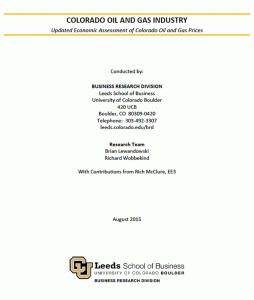 Updated Economic Assessment of Colorado Oil and Gas Prices
Updated Economic Assessment of Colorado Oil and Gas Prices
Contact:
Brian Lewandowski, Leeds School, 303-492-3307
brian.lewandowski@colorado.edu
Dirk Martin, CU-Boulder media relations, 303-492-3140
dirk.martin@colorado.edu
Julie Poppen, CU Boulder media relations, 303-492-4007
julie.poppen@colorado.edu
Aug. 21, 2015
Editors: For brief audio files of Brian Lewandowski discussing Colorado’s oil and gas outlook visit www.colorado.edu/news/sites/default/files/brian_on_study.mp3.
Low Colorado oil and gas prices to have cascading effect on state production and revenues
Colorado will record a decrease in oil and gas production in 2015 — the domino-like result of declines across the industry, according to a new study.
The new forecast released today by the Leeds School’s Business Research Division shows Colorado oil spot prices down by 49 percent and natural gas prices down by 30 percent in July compared with the same month in 2014.
“The sharp decline in prices has had delayed but measureable impacts on rig counts, industry employment and taxes,” said Brian Lewandowski, lead author and associate director of the Business Research Division. “While production thus far has remained stable, we anticipate a fall.”
One side effect of the decline could be property and severance taxes paid by the oil and gas industry. They translate to a public revenue stream for Colorado counties, cities, special districts and school districts.
“What happens when the prices are cut in half? That revenue stream is essentially cut in half,” said Lewandowski.
Oil and gas wells typically record the greatest volume of production during their first year followed by decreasing volume at a slower rate with each successive year of operation, according to Lewandowski. However, examining Colorado production from 1970 to 2014, each successive five-year period recorded steeper depletion curves and the 2010 to 2014 span saw unprecedented depletion, according to the assessment.
Researchers from the Leeds School worked with EE3, LLC to analyze IHS data from 2010 to 2014. During that time, Colorado averaged about 240 new oil and gas wells per month. By contrast, Colorado in 2014 brought an average of 157 new wells online per month.
“Given production depletion, a steady supply of wells is necessary to backfill lost production,” said Lewandowski. “Based on historical production and rig counts, Colorado would need to bring on about 170 wells per month in perpetuity to keep production constant.”
The average number of operating oil and gas rigs in Colorado for the first half of 2015 was 43, while the average number of rigs in the past has been 68 in 2014, 63 in 2013, 65 in 2012 and 72 in 2011, according to Baker Hughes.
The study was conducted by the Business Research Division (BRD) of the Leeds School of Business at the University of Colorado Boulder on behalf of a partnership between the Metro Denver Economic Development Corporation (Metro Denver EDC), the Denver South Economic Development Partnership (Denver South EDP) and the Common Sense Policy Roundtable (CSPR).
For the Colorado oil and gas forecast visit
www.colorado.edu/leeds/2015/08/20/updated-economic-assessment-colorado-oil-and-gas-prices
-CU-
Podcast: Play in new window | Download
Subscribe: RSS

